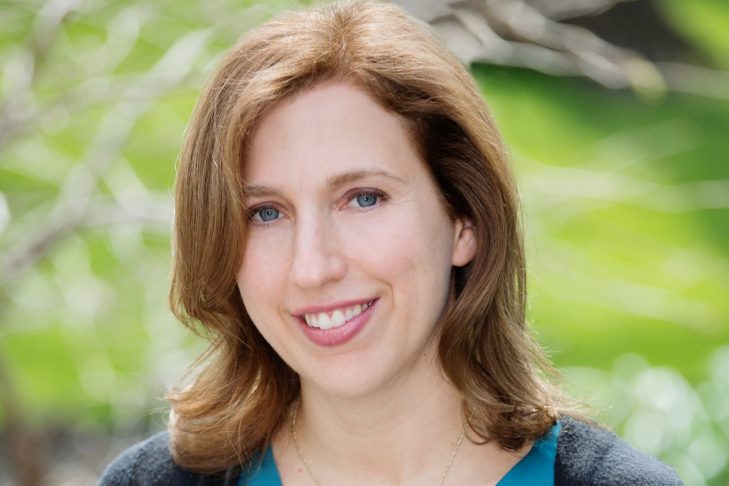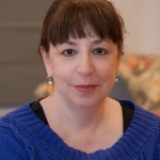Dara Horn was surprised that her editor let her use her preferred title for her latest book. “The title will shock you,” she told the audience at the Boston College Center for Christian-Jewish Learning, where she spoke on April 19. An award-winning writer of six books, Horn’s most recent work is “People Love Dead Jews: Reports from a Haunted Present” (W.W. Norton & Company, 2021). “This book and this talk,” she asserted, “will make you uncomfortable.”
Her goal in her writing and speaking is to address the issue of why there seems to be a fascination with Jewish deaths and not with the inspiring, multifaceted life of Jews in the past and present. She often found she was being asked to write about dead Jews, not living ones.
Horn pointed out that Yom HaShoah honors the largest single revolt by Jews during World War II, the Warsaw Ghetto uprising, which took place in 1943. The day serves as a reminder of the heroic acts of Jewish resistance. In contrast, International Holocaust Remembrance Day recalls the Soviet forces’ freeing of the inmates of Auschwitz. “This was a case where Jews had no agency,” said Horn. “There are consequences to honoring Jews without agency.”
She asked the audience, “How many of you can name three concentration camps? How many can name three Yiddish writers? I ask because 80% of the Jews who were murdered were Yiddish speakers. Why do we care so much about how they died if we’re not interested in how they lived?”
Horn also demolished a legend regarding Ellis Island—the myth of Jewish name changes by clerks processing incoming immigrants. “It never happened,” affirmed Horn. “People went to court to change their names because of the American antisemitism at the time. So they could get jobs, buy homes and stay in hotels. The story buries the reality of American antisemitism.”
Horn was recently asked to write an article in The Atlantic. The question was: “Is Holocaust education working?” Her response: “No.” She pointed out that Holocaust museums and educational programs are designed to inoculate against antisemitism. “So why is it now a bigger problem?” she asked, pointing out that a study of Gen Z (Americans born during the late 1990s and early 2000s) revealed that 11% believe that Jews caused the Holocaust. Horn discussed the futility of taking someone who says that Jews are bad to a Holocaust museum. “A person can then feel good saying that Nazis are bad and still feel OK about themselves. Jews are, in a sense, taken out of world history. They don’t think of engaging with living Jews.”
Horn went on to point out that the National Museum of African American History and Culture in Washington, D.C., does not focus on slavery. “This would be an insult to African Americans,” she said. She believes that Holocaust education and museums “erase living Jews, and there is still antisemitism before and after.” She recalled an incident in a Texas Holocaust museum when a student asked, “Are there still Jews alive today?”
There are still antisemitic attacks on Jews in the press, she noted. Jews were murdered in New Jersey in 2019 and a subsequent attack. The press noted that some Jews had been involved in zoning disputes. “The message,” said Horn, “’They deserve it.’ On campus there are self–loathing Jews who internalize antisemitism and have no education in Jewish life. Some decide that for safety they self-erase, hide their kippot or Star of David necklace.”
Horn asserted that fighting antisemitism involves, “Talking about Jews and the richness and beauty of this life. The past is always present. We all escaped from Egypt, we were all at Sinai.” Jewish contributions to the world are countless, including monotheism, sacred texts, Shabbat, the 10 Commandments, as well as contributions to science, literature, arts and culture and human rights.
Horn noted that there is a group of Wampanoag Native Americans seeking to revive their language. They sought advice from the Jewish community because they wanted to know how it was done with Hebrew. “The only language,” Horn pointed out, ”to be revived and used in the modern world by an entire country.”
While there is no easy solution to antisemitism, Horn offered as an example the story of Derek Black, a white nationalist who attended New College of Florida. Former KKK grand wizard David Duke was his godfather. Black was in line to take a leadership role in the movement. Many would say, “Take him to the Holocaust museum.” But Jewish students befriended him and invited him to Shabbat dinner. He went to many, talked to Jewish students and gradually renounced his white nationalism.
Horn’s book was honored with the 2021 National Jewish Book Award for Contemporary Jewish Life and Practice; as a finalist for the 2021 Kirkus Prize in Nonfiction; as a New York Times Notable Book of the Year and as a Wall Street Journal, Chicago Public Library, Publishers Weekly and Kirkus Reviews Best Book of the Year. Horn has taught at several colleges, including Sarah Lawrence College, the City College of New York and Harvard University. Her many honors include winning the National Jewish Book Award twice. She has a podcast, “Adventures with Dead Jews.”
This post has been contributed by a third party. The opinions, facts and any media content are presented solely by the author, and JewishBoston assumes no responsibility for them. Want to add your voice to the conversation? Publish your own post here. MORE



